Blog
Top Stories
India–Cyprus Bilateral Relations: An Overview of Strategic, Economic and Business Engagement
India and the Republic of Cyprus share a long-standing relationship rooted in mutual trust, shared democratic values, and close cooperation across political, economic, and multilateral platforms. Over the past six decades, bilateral ties have expanded steadily, with growing engagement in trade, investment, defence, innovation, maritime cooperation, and people-to-people exchanges.
This document provides a comprehensive overview of India–Cyprus bilateral relations, highlighting key diplomatic milestones, high-level exchanges, institutional mechanisms, trade and investment trends, and opportunities for deeper economic and business collaboration. It also reflects the strengthening role of chambers of commerce and business councils in advancing partnerships between the two countries, including the growing involvement of Indian industry in Cyprus as a gateway to Europe.
Bombay Chamber webinar highlights urgent DPDP compliance needs
Bombay Chamber webinar highlights urgent DPDP compliance needs
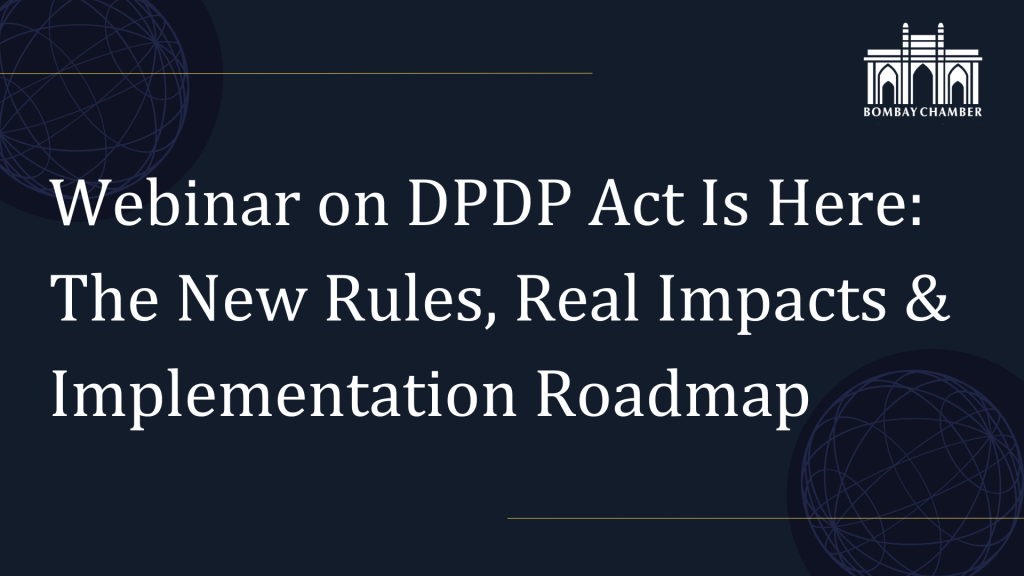
Mumbai: The Bombay Chamber of Commerce and Industry, through its Legal & IPR Committee, convened a high‑level webinar on the Digital Personal Data Protection (DPDP) Act and the newly notified rules. The programme brought together leading legal experts and industry representatives to explore the legislation’s wide‑ranging impact and to share practical insights on how businesses can adapt to an evolving regulatory environment.
Held on December 05, 2025, the session clarified the compliance requirements organisations must meet within the 18‑month transition period. Sandeep Khosla, Director General of the Bombay Chamber, delivered the welcome address and acknowledged the efforts of Attreyi Mukherjee, Co‑Chair of the Legal & IPR Committee and Vice‑President & Head of Legal, Mahindra & Mahindra (EV Business), for her role in actively shaping and planning the discussions.
Speakers Supratim Chakraborty, Partner at Khaitan & Co, and Sumantra Bose, Counsel at Khaitan & Co, outlined the scope of the Act and explained how it reshapes organisational accountability. They emphasised that the law introduces binding standards for consent, data minimisation, breach response, retention controls and governance. The discussion highlighted that these obligations are not routine adjustments but fundamental changes to how enterprises handle personal data.
Participants were reminded that the compliance window is short and that delaying action could expose organisations to operational disruption, legal consequences and reputational damage. The speakers examined practical steps for implementation, including revising contracts, updating internal processes and strengthening technical safeguards. They also addressed the role of consent managers, the handling of children’s data, and the responsibilities of significant data fiduciaries.
The session explored the challenges of breach reporting, particularly the requirement to notify multiple regulators and affected individuals. Attention was also given to data retention and deletion, with guidance on navigating the new framework. The speakers noted that organisations must prepare for audit‑ready governance and be able to demonstrate compliance at short notice.
Cross‑border data transfers were another area of focus, with discussion on how the rules alter existing practices and what safeguards are now expected. The webinar also touched on mergers and acquisitions, stressing that data protection considerations will become central to due diligence and transaction planning.
The panel discussion and Q&A session, moderated by Attreyi Mukherjee, Co‑Chair of the Legal & IPR Committee, Bombay Chamber and Vice‑President & Head of Legal, Mahindra & Mahindra (EV Business), highlighted the need for companies to treat compliance as an immediate priority, not something to be delayed. The speakers stressed that the Act requires organisations to act now, both to meet legal requirements and to maintain the trust of customers and stakeholders.
The webinar helped cut through the complexity of the legislation and gave attendees clear, practical insights. By explaining the law’s requirements and the risks of non‑compliance, it underscored the need for proactive preparation during the transition period.
(Write to us at editorial@bombaychamber.com)
Corporate governance and legal experts discuss SEBI amendments to LODR and ICDR regulations
Corporate governance and legal experts discuss SEBI amendments to LODR and ICDR regulations
Mumbai: The Bombay Chamber of Commerce and Industry hosted a seminar on the recent amendments to the Securities and Exchange Board of India’s Listing Obligations and Disclosure Requirements (LODR) and Issue of Capital and Disclosure Requirements (ICDR) regulations. The event brought together industry leaders, legal experts and regulatory professionals to examine the implications of these changes and their impact on corporate governance and compliance.
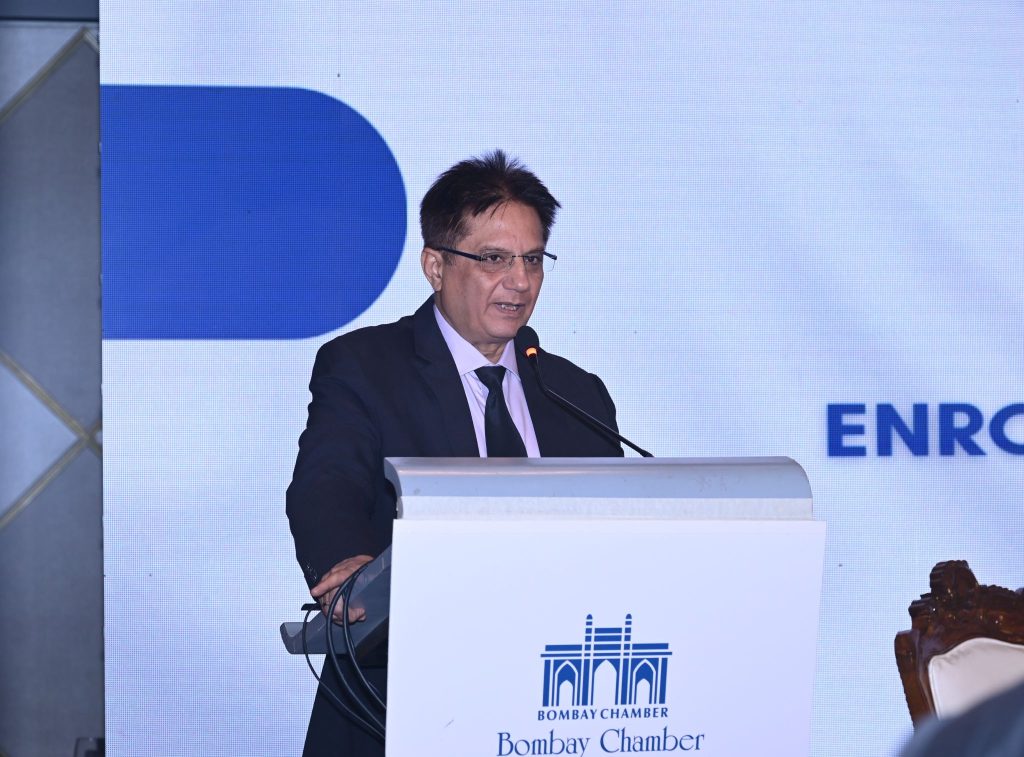
The seminar opened with a welcome address by Sandeep Khosla, Director General, Bombay Chamber, who highlighted the importance of understanding regulatory amendments and their role in fostering transparency and accountability in the corporate sector.
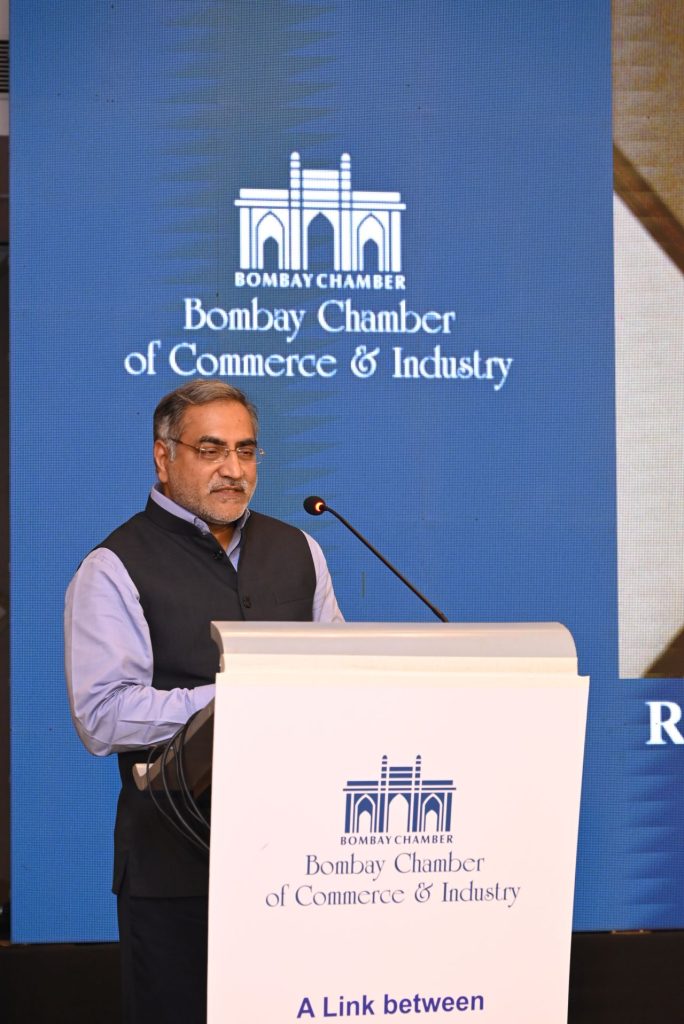
The keynote address was delivered by Jeevan Sonparote, Executive Director at SEBI. He provided an overview of the amendments, emphasising SEBI’s commitment to enhancing disclosure standards and streamlining compliance processes. His remarks set the tone for the evening, underscoring the significance of these changes in strengthening investor confidence and promoting fair practices in the capital markets.
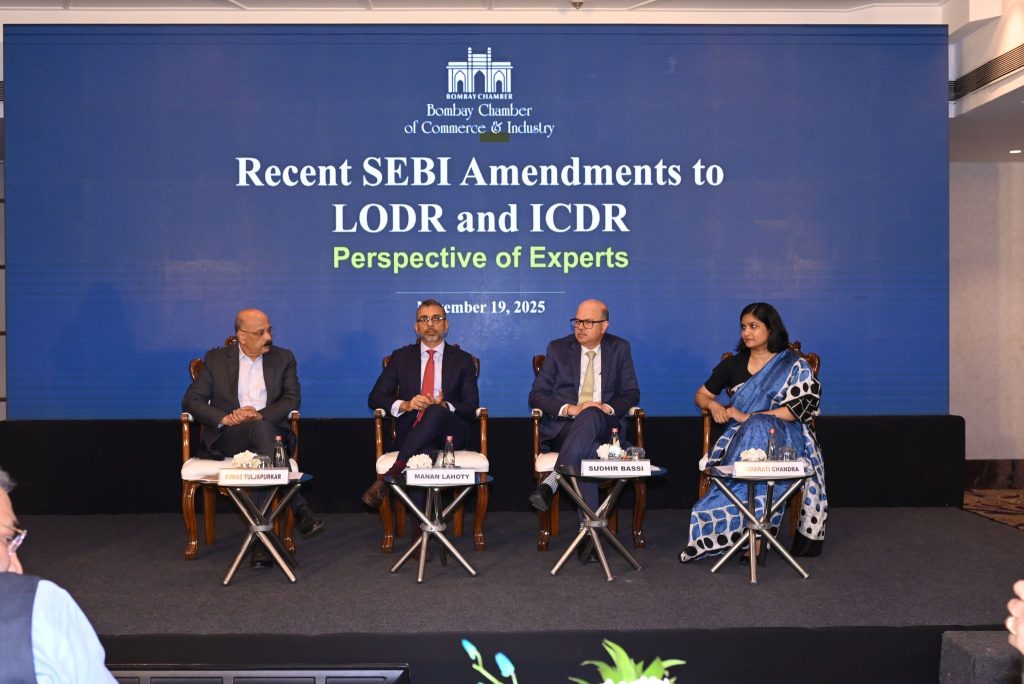
The first panel discussion, moderated by Suhas Tuljapurkar, Founder and Managing Partner of Legasis Partners and Co‑Chairperson of the Corporate Governance Committee at the Bombay Chamber, examined the ICDR amendments in detail. The conversation explored key changes, including the alignment of promoters’ lock‑in periods with the use of proceeds, the introduction of a single advertisement two days prior to the issue, expanded disclosure requirements covering transactions, placements, litigation, agreements, financials and employee‑related matters, and the revised framework for rights issues.
Panellists Manan Lahoty, Partner and Head of Capital Markets at Cyril Amarchand Mangaldas, Sudhir Bassi, Executive Director of Capital Markets at Khaitan & Co., and Jabarati Chandra, Partner at S&R Associates, shared their perspectives on the implications of these changes. They discussed the removal of the ₹50 crore threshold for rights issue applicability and the shift in filing draft offer documents from SEBI to stock exchanges. The session also examined the evolving role of merchant bankers and the increasing involvement of legal professionals in capital market transactions.
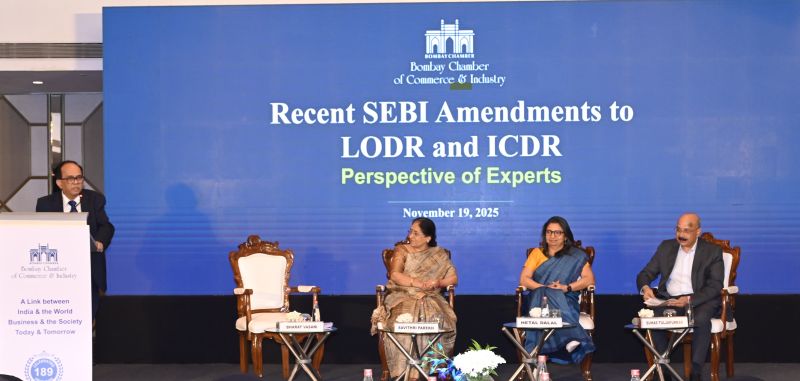
The second panel discussion focused on the latest amendments to LODR regulations and their impact on compliance. Moderated by Bharat Vasani, Senior Advisor on Corporate Laws at Cyril Amarchand Mangaldas and Chairperson of the Legal Affairs & IPR Committee at the Bombay Chamber, the session addressed critical topics such as challenges in identifying related parties, evolving disclosure standards, brand royalty payments and practical difficulties in adhering to the ‘purpose and effect’ test.
Panellists Hetal Dalal, President and Chief Operating Officer of Institutional Investor Advisory Services India Ltd., Savithri Parekh, Company Secretary and Compliance Officer at Reliance Industries Ltd. and Chairperson of the Corporate Governance Committee at the Bombay Chamber, and Suhas Tuljapurkar offered valuable insights into navigating these challenges. They also discussed the role of audit committees in determining arm’s length pricing and ensuring compliance with the amended regulations.
The seminar concluded with a vote of thanks by Sandeep Khosla, who emphasised the Chamber’s commitment to fostering dialogue and collaboration among industry leaders, regulators and professionals to promote best practices in corporate governance and compliance. This was followed by networking, where attendees engaged with peers and experts. The event provided a platform for meaningful discussions on the evolving regulatory landscape and its implications for businesses and stakeholders.
Nilesh Shah stresses ‘Mutual Fund Sahi Hai, Par Sirf Equity Nahin Hai’ at Bombay Chamber Mutual Fund Conclave 3.0
Nilesh Shah stresses ‘Mutual Fund Sahi Hai, Par Sirf Equity Nahin Hai’ at Bombay Chamber Mutual Fund Conclave 3.0
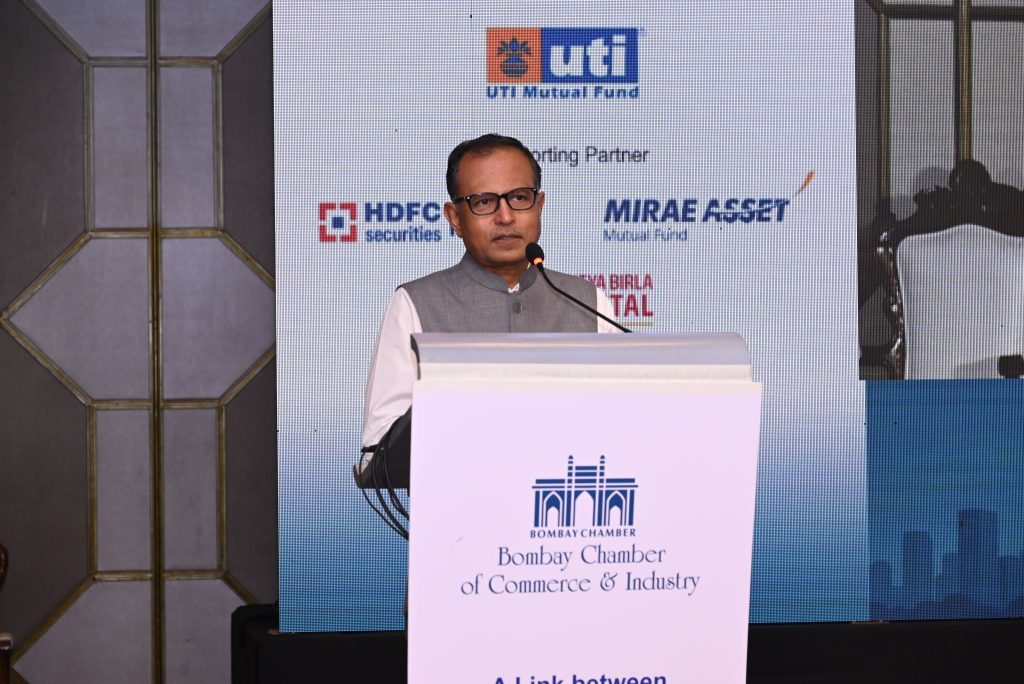
“Mutual Fund Sahi Hai, par sirf equity nahin hai,” said Nilesh Shah, Past President of the Bombay Chamber and Group President & Managing Director of Kotak Mahindra Asset Management Company, in his special address at Mutual Fund Conclave 3.0, organised by the Bombay Chamber in Mumbai. Shah noted that while the industry has effectively built trust in mutual funds, the next phase of growth must expand investor awareness and product adoption beyond equities.
Reviewing the industry’s evolution, Shah pointed out that mutual funds have often provided exit routes to both FPIs and promoters, and reminded that such actions must always remain aligned with the long-term interests of Indian investors. India, he said, enjoys a rare alignment between investors and distributors, placing the domestic mutual fund industry among the most transparent globally.
He highlighted a key contrast: even with ₹80 lakh crore in assets under management, Indians continue to hold large sums of idle cash and participate heavily in derivatives—despite nine out of ten derivative traders losing money. He juxtaposed this with the remarkable success of the SEBI-mandated “Mutual Fund Sahi Hai” campaign, which reached over five crore individuals and played a pivotal role in shaping a more informed investor base. Yet, he observed that while equity participation has risen sharply, categories such as debt and precious metals remain significantly under-represented compared to traditional physical holdings.
Shah cited the example of a woman saving for months to buy gold jewellery—despite high making charges and limited financial returns—to illustrate how investment behaviour is shaped by generations of habit, not short-term persuasion. He urged the industry to build products and investor engagement models that appeal to safety-seeking savers, supporting them on the journey from traditional accumulation to structured financial growth.
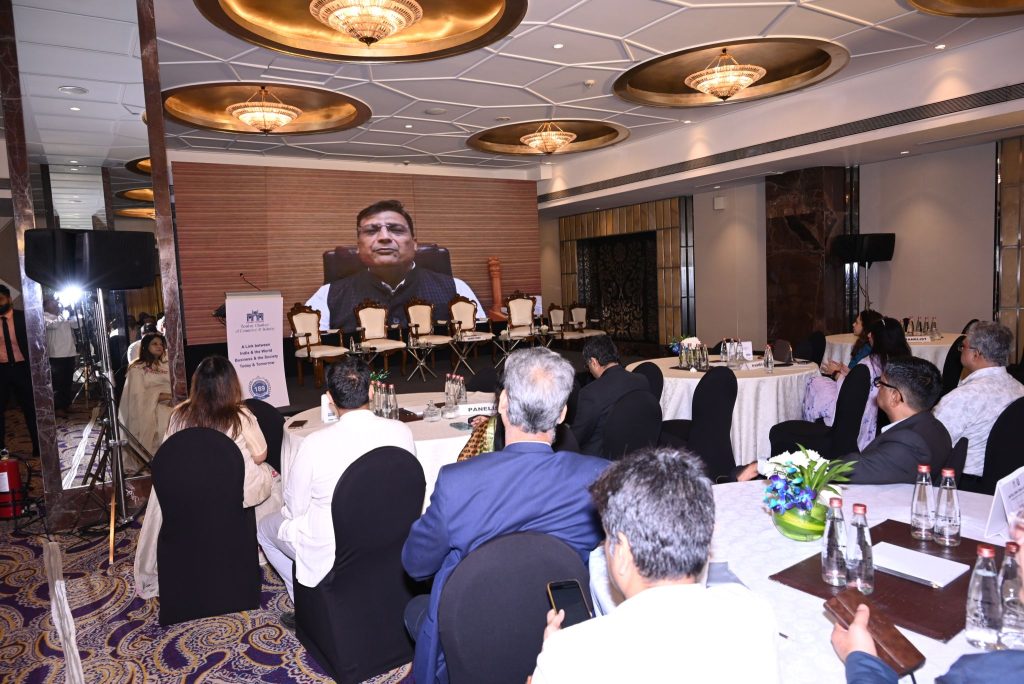
Setting the theme for the Conclave, Navneet Munot, Director at the Bombay Chamber and Managing Director & CEO of HDFC Asset Management Company, in his video address, reflected on the role of mutual funds in helping build a more inclusive and confident financial Bharat. He noted that India is transitioning from a nation of savers to a nation of investors, with nearly 60% of new SIP registrations now coming from Tier-2 and Tier-3 cities. Monthly SIP flows of ₹29,000 crore and annual domestic equity flows of nearly $40 billion reflect a structural shift in household financial behaviour, reducing dependence on foreign capital. Munot described this as a “silent revolution,” built on track record, transparency, technology and investor training—pillars that have strengthened trust and widened participation. He urged the industry to maintain its mission-led approach as India progresses toward 2047, ensuring that capital markets contribute to broad-based prosperity and long-term value creation.
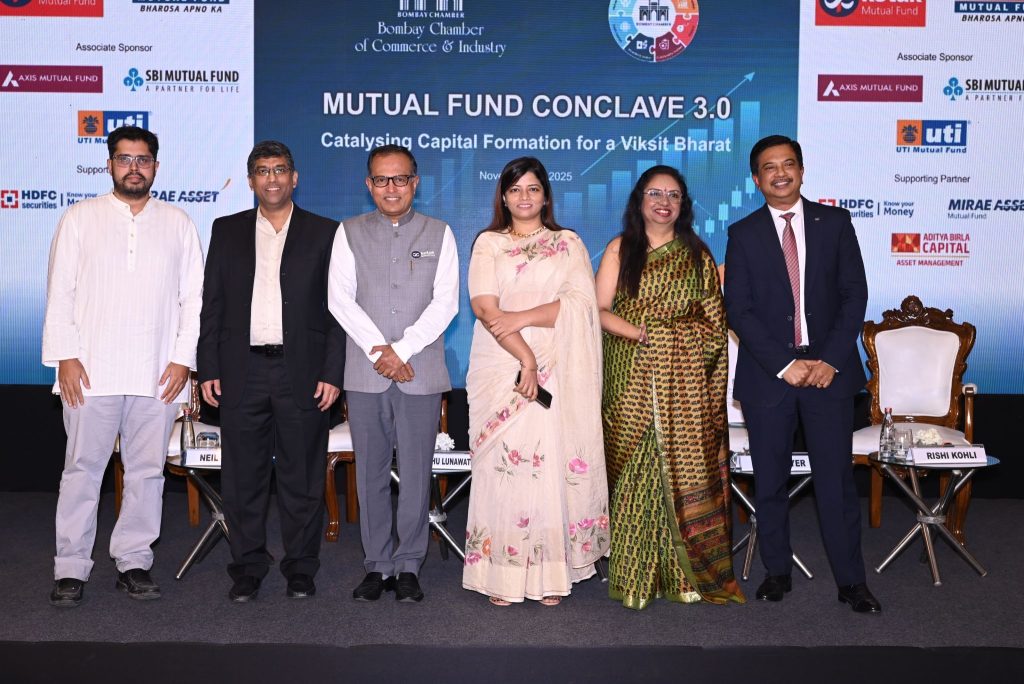
The first panel discussion of the day, Mutual Funds – Mobilising Savings from Bharat, led by Moderator Neil Borate, Editor-in-Chief, thefynprint, featured panellists Madhu Lunawat (Founder & CEO, The Wealth Company Asset Management), Swarup Mohanty (Vice Chairman & CEO, Mirae Asset Investment Managers) and Chitra Iyer (CEO, MFA), highlighted the importance of improving relevance and access for first-time investors, particularly across Bharat. Chitra Iyer, CEO of MFA, stressed that SIPs must be treated not as products but as behavioural commitments, and called for communication that empowers investors rather than merely sells to them. Swarup Mohanty, Vice Chairman & CEO of Mirae Asset Investment Managers, posed a fundamental question—why don’t more Indians feel the need to invest—and encouraged deeper reflection on making mutual funds more meaningful to new investors. Madhu Lunawat, Founder & CEO of The Wealth Company Asset Management, advocated for a hybrid distribution model that blends digital outreach with personal engagement, noting that many distributors still lack even a basic online presence. Rishi Kohli, CIO of JioBlackRock Mutual Fund, observed that digital partners often focus disproportionately on new customer acquisition, and stressed the need for stronger post-investment support, including service infrastructure and call-centre capabilities, to empower and retain investors.
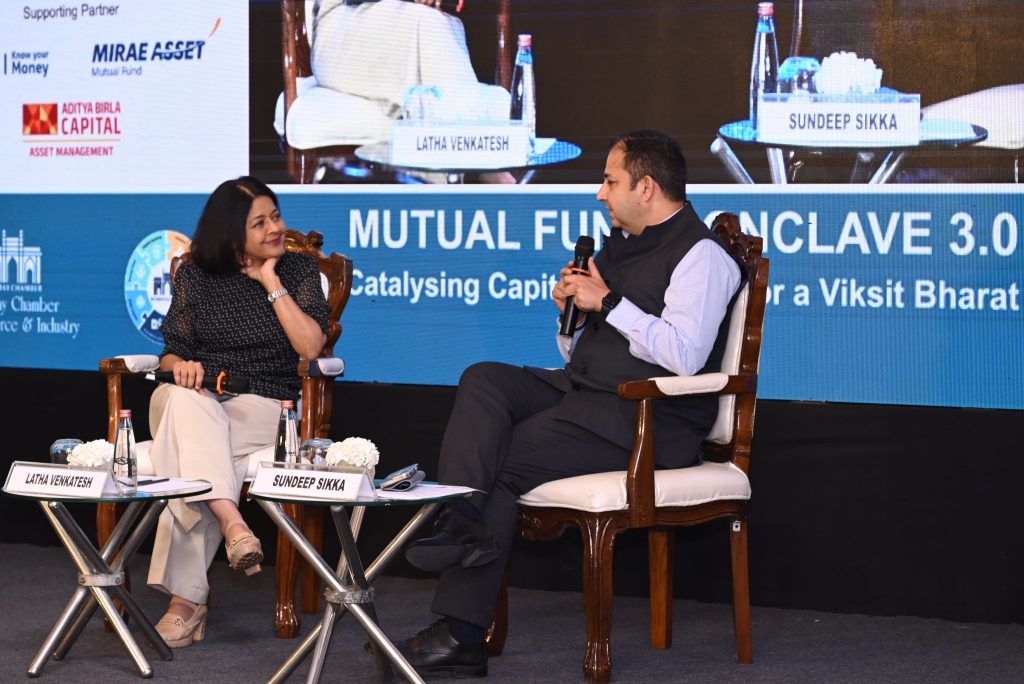
A Fireside Chat with Sundeep Sikka, Chairman of AMFI and ED & CEO of Nippon Life India AMC, conducted by Latha Venkatesh, Executive Editor, CNBC-TV18, explored the growing footprint of mutual funds across the country. Sikka remarked that directly or indirectly, every Indian is already a mutual fund investor, and highlighted that financial behaviour is shaped slowly through experience, trust, and sustained education. He called on the industry to scale responsibly, build deeper investor touchpoints, and continue nurturing a data-led, trust-driven investing culture across Bharat.
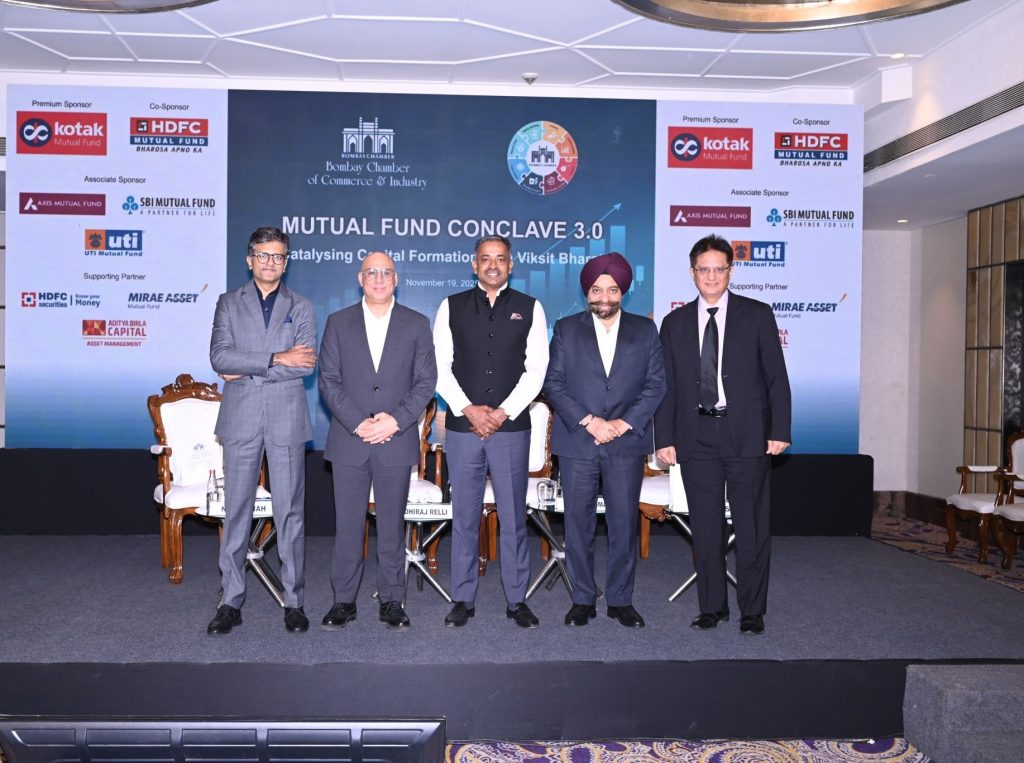
The second panel of the day, titled Mutual Funds & IPOs – Growth Drivers for a Viksit Bharat, was moderated by Niraj Shah, Executive Editor, NDTV Profit, and brought together Dhiraj Relli (MD & CEO, HDFC Securities Ltd), B. Gopkumar (MD & CEO, Axis AMC), and D.P. Singh (DMD & Joint CEO, SBI Mutual Fund). Relli highlighted the importance of professionally managed portfolios, particularly for individuals who lack the time or expertise to manage investments, and pointed to GIFT City as a gateway opening global markets to Indian investors. Gopkumar stressed the need to support households in building wealth prudently even during expensive market phases, reinforcing the value of discipline and long-term investing. Singh noted that while current flows remain concentrated in regulated markets, India is steadily moving toward greater participation in private markets—a shift that could unlock substantial wealth creation.
Bombay Chamber Sustainability Conclave focuses on Circular Economy and product innovations needed to achieve material efficiency
Bombay Chamber Sustainability Conclave focuses on Circular Economy and product innovations needed to achieve material efficiency
Bombay Chamber’s annual Sustainability Conclave 2025 held yesterday at the St Regis Hotel Mumbai, focused on Closing the Loop: Circular Pathways to Business.
With a line-up of eminent leaders in the field, the Conclave touched upon the current scenario in circularity and the challenges within. Panelists were in agreement that policy interventions were the need of the hour to incentivise players who have entered the field.
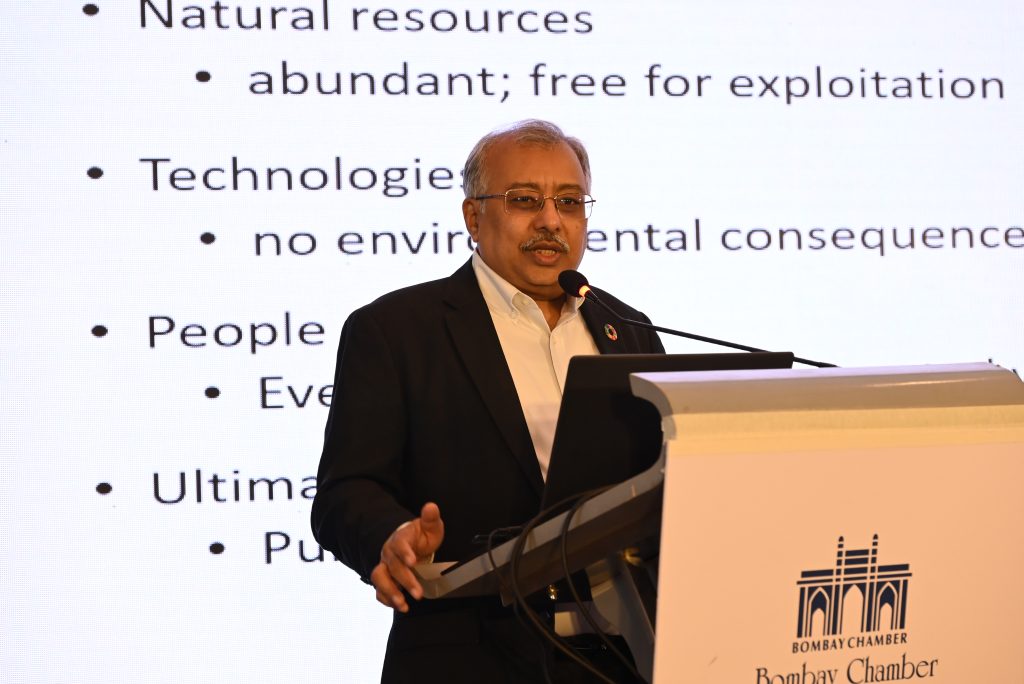
In his theme setting address, Anirban Ghosh, Head – Centre for Sustainability, Mahindra University and chairperson Sustainability Committee, Bombay Chamber said, “Our societal norms often encourage uncontrolled consumption and waste, which harms the environment. This is where the concept of a circular economy comes in – a system that promotes sustainability and efficient use of resources. The need for a circular economy is urgent, as there’s no Planet B to fall back on.
To achieve this, we need to adopt pathways like reducing the use of virgin materials and increasing the lifespan of materials in use. Research in circular economy is gaining momentum, focusing on: Circular materials and bio-based polymers and urban mining and e-waste recovery.”
He observed that the potential value from waste management is substantial. “Just a few years ago, the value was negligible, but now it’s over ₹100 crores. This shift highlights the importance of embracing a circular economy and rethinking our relationship with resources, “he said.
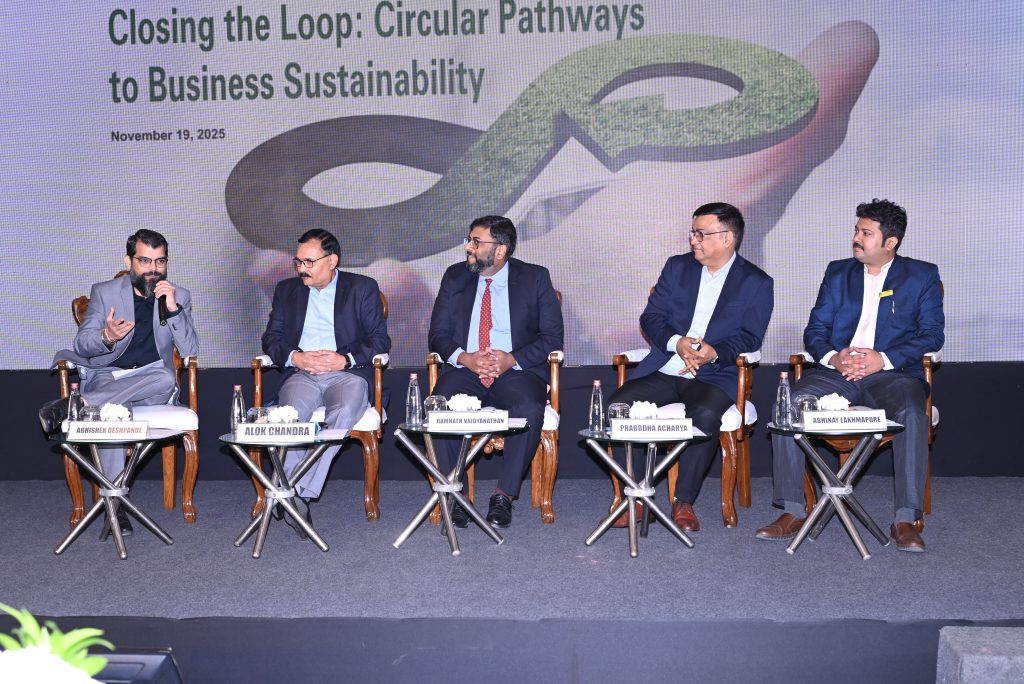
This was followed by a panel discussion on Beyond Compliance: Leveraging EPR for Business Sustainability. The panel was moderated by Abhishek Deshpande – Co-Founder & COO, Recykal and the panelists included Alok Chandra – Chief HSE & Sustainability Officer, Tata Chemicals; Ramnath Vaidyanathan – Head – Environmental Sustainability Godrej Industries Group; Prabodha Acharya – Chief Sustainability Officer, JSW Group and Abhinay Lakhmapure, Chief Business Officer – Sustainability, The Shakti Plastic Industries.
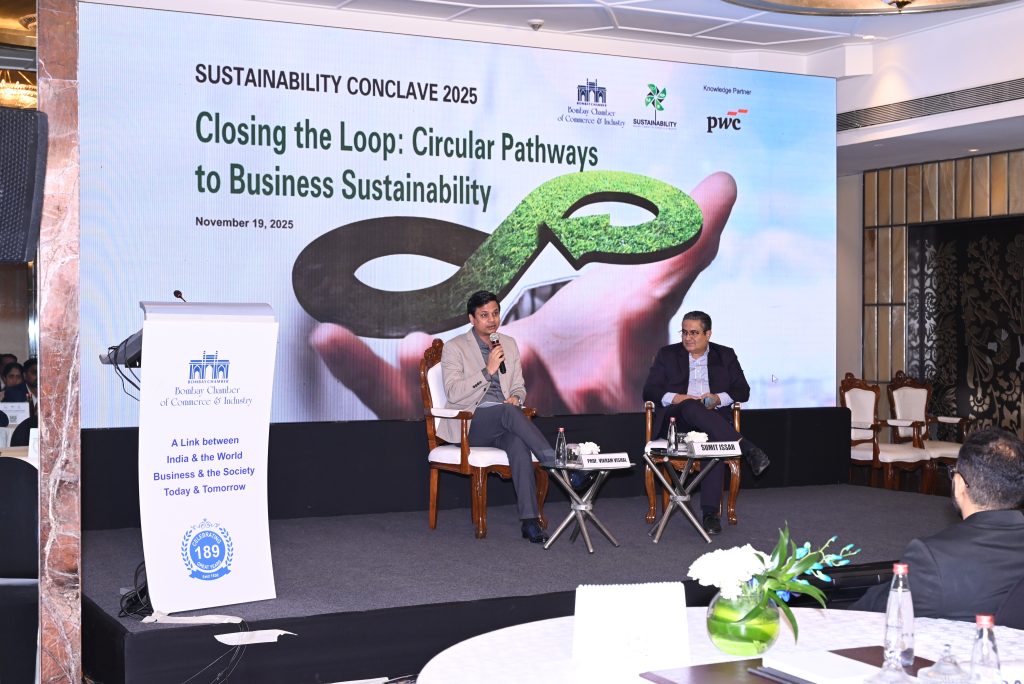
This was followed by a Fireside Chat on Collaboration Across Value Chains: Building Ecosystems for Circular Growth between Prof. Vikram Vishal, Professor and Convener, National Centre of Excellence in CCUS, IIT Bombay, Co-founder and CEO, UrjanovaC and Sumit Issar, MD & CEO, Mahindra Accelo Ltd. and Mahindra Steel Service Centre Ltd.; Director, CERO (Mahindra MSTC Recycling Pvt. Ltd.); Board Member, Mahindra Auto Steel Pvt. Ltd., Mahindra Middle East, and PT Mahindra Auto Steel Indonesia. Issar outlined the purpose of setting up CERO – to bring the hassle-free vehicle recycling experience to every doorstep and help everyone contribute towards a greener future. Prof Vishal spoke about the initiatives IIT Bombay is doing in the field of circularity.
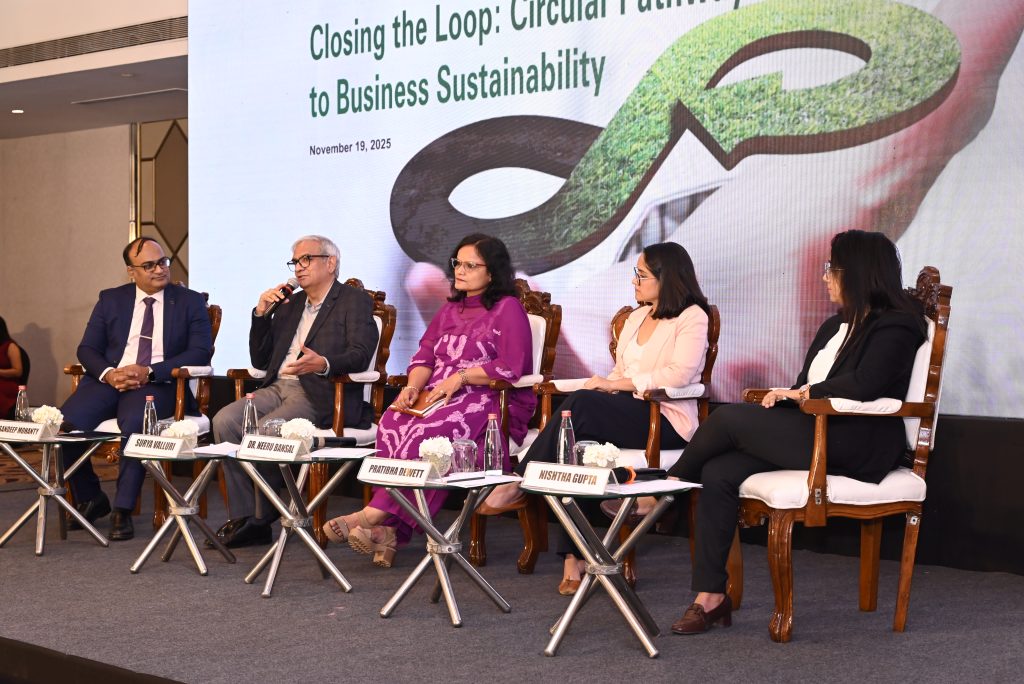
The second panel discussion was on Design to Disposal: Product Innovation, Data and Material Efficiency. The session was moderated by Sandeep Kumar Mohanty, PwC, Partner – Sustainability Transformation, iBT, One Consulting and the panel members were Surya Valluri – Chief Sustainability Officer, Grasim Industries; Dr. Neeru Bansal – Chief Sustainability Officer, Cement Business, Adani Group; Pratibha Dewett – Chief Sustainability Officer, Lucro Plastecycle and Nishtha Gupta– Group Head – Sustainability & ESG, Suzlon Energy. The panel deliberated on how it is necessary for organisations to move from compliance to competitiveness and design products sustainable by nature. They agreed that scalability brings competitiveness and this will come only when consumers are aware of it. Brands and value chains need to brand around circularity which is not the scenario at the moment. They also discussed how digitalization can help move the needle on circularity.
Credit guarantee scheme aims to boost India’s export competitiveness.
Credit guarantee scheme aims to boost India’s export competitiveness

Mumbai: The Union Cabinet’s approval of the Credit Guarantee Scheme for Exporters (CGSE) is expected to provide a significant boost to India’s export-oriented industries, particularly micro, small and medium enterprises (MSMEs). The scheme, to be implemented by the Department of Financial Services (DFS) through the National Credit Guarantee Trustee Company Limited (NCGTCL), will extend collateral-free credit support of up to ₹20,000 crore to eligible exporters. Member Lending Institutions (MLIs) will receive 100 per cent guarantee coverage, reducing risk and enabling them to provide additional credit facilities to businesses engaged in international trade. A management committee chaired by the secretary of the DFS will oversee implementation, ensuring accountability and monitoring progress.
Exports remain a critical pillar of the Indian economy, accounting for nearly 21 per cent of gross domestic product (GDP) in FY2024-25 and contributing substantially to foreign exchange reserves. Export-oriented industries directly and indirectly employ more than 45 million people, with MSMEs responsible for nearly 45 per cent of total exports. The CGSE is therefore positioned to strengthen liquidity across a wide base of enterprises, ensuring smoother operations and supporting employment in sectors that are highly sensitive to global demand fluctuations.
The scheme is expected to enhance the global competitiveness of Indian exporters by enabling them to diversify into new and emerging markets. Access to collateral-free credit will allow businesses to invest in product development, expand production capacity and meet compliance requirements in overseas markets. For MSMEs, which often face difficulties in securing affordable finance, the guarantee mechanism offers a pathway to scale operations and participate more effectively in global supply chains.
India has set an ambitious target of achieving $1 trillion in exports, and sustained growth in this area is vital for maintaining macroeconomic stability. By addressing liquidity constraints, the CGSE provides exporters with the financial flexibility needed to navigate tariff barriers, rising costs and slowing demand in traditional markets. The scheme also reinforces the government’s broader objective of building resilience in the economy and advancing the vision of Aatmanirbhar Bharat.
Export-oriented industries such as textiles, engineering goods, pharmaceuticals and handicrafts stand to benefit from the initiative. These sectors have consistently contributed to India’s trade performance but face challenges in accessing timely credit. The CGSE offers a structured solution by reducing risk for lenders and ensuring that exporters, particularly smaller firms, are not excluded from financial support due to lack of collateral.
To make this scheme a success, effective execution will be essential, along with exporters’ ability to use the additional liquidity for expanding markets and strengthening competitiveness. If carried out efficiently, the CGSE has the potential to play a pivotal role in sustaining export growth while supporting millions of jobs connected to the sector.
(Write to us at editorial@bombaychamber.com)
Government targets startups, industrial players with ₹100 crore biomass hydrogen fund
Government targets startups, industrial players with ₹100 crore biomass hydrogen fund

Mumbai: The Indian government has unveiled a ₹100 crore funding initiative aimed squarely at startups, industrial players and research institutions developing biomass-based green hydrogen technologies. The initiative invites proposals for pilot projects that convert biomass and waste materials into green hydrogen, with the Biotechnology Industry Research Assistance Council (BIRAC) designated to oversee its implementation. Union Minister for New & Renewable Energy Pralhad Joshi unveiled the scheme at the 3rd International Conference on Green Hydrogen in New Delhi, highlighting the importance of diversifying hydrogen production pathways beyond conventional electrolysis.
The initiative falls under the National Green Hydrogen Mission (NGHM), launched in 2023 with a budget of ₹19,744 crore. The mission aims to decarbonise hard-to-abate sectors and position India as a global hub for green hydrogen. According to the Ministry of New and Renewable Energy, the scheme is intended to catalyse innovation in thermochemical and biochemical conversion processes, as well as in hydrogen storage, transport and end-use applications. Each selected project could receive up to ₹5 crore, with the goal of demonstrating scalable and cost-effective solutions.
The move comes amid growing interest in alternative hydrogen pathways that can leverage India’s agricultural and organic waste streams. By supporting decentralised production models, the government hopes to reduce reliance on water-intensive electrolysis and promote rural innovation.
The NGHM has already made headway through its Strategic Interventions for Green Hydrogen Transition (SIGHT) programme. Incentives have been awarded for 3,000 MW per annum of domestic electrolyser manufacturing and 8.62 lakh metric tonnes per annum of green hydrogen production. India currently records the world’s lowest green ammonia price at ₹49.75 per kg for 7.24 lakh metric tonnes per annum of output.
Additional investments include ₹132 crore in green steel pilots, ₹208 crore for hydrogen-fuelled vehicles and refuelling stations, and ₹35 crore for the country’s first hydrogen bunkering facility at V.O. Chidambaranar Port. The government has also approved 43 hydrogen-related skill qualifications and certified over 6,300 trainees to support workforce development.
Speaking at the conference, Principal Scientific Adviser Prof. Ajay K. Sood noted that India enjoys a cost advantage in green hydrogen production compared to several other nations, which could enable it to become a major exporter to markets such as the European Union, Japan and South Korea.
The biomass pilot scheme is expected to attract early-stage innovators and contribute to the broader goal of building a resilient and inclusive hydrogen ecosystem. As India moves towards its target of 500 GW of renewable capacity by 2030, the success of such initiatives will be critical in shaping the country’s energy transition.
(Write to us at editorial@bombaychamber.com
Union Commerce and Industry Minister Shri Piyush Goyal addresses the 4th AGM of Mobile and Electronic Devices Export Promotion Council
Union Commerce and Industry Minister Shri Piyush Goyal addresses the 4th AGM of Mobile and Electronic Devices Export Promotion Council

Union Minister of Commerce and Industry Shri Piyush Goyal was the Chief Guest at the 4th Annual General Meeting (AGM) of the Mobile and Electronic Devices Export Promotion Council (MEDEPC) held today at Vanijya Bhawan, New Delhi.The meeting was convened in the presence of senior officials from the Ministry of Commerce and Industry, the Directorate General of Foreign Trade (DGFT), and leading representatives from India’s electronics and mobile export ecosystem.
Speaking on the occasion, Union Minister Shri Piyush Goyal underscored the need to deepen domestic capabilities across the electronics value chain, noting that greater self-reliance in both finished products and components will be key to sustaining India’s export momentum and reducing import dependence.
India’s electronics manufacturing sector is witnessing a period of unprecedented transformation — propelled by visionary policy initiatives, record investments, and expanding global partnerships. Aligned with the Hon’ble Prime Minister’s vision of achieving USD 500 billion in electronics manufacturing by 2030, India has rapidly positioned itself as a reliable global hub for electronics design, production, and exports.
India’s export performance reflects a remarkable growth story, with overall electronics exports surging by 41.9%, reaching USD 22.2 billion during April–September 2025, compared to USD 15.6 billion in the same period last year. Smartphone exports grew by an impressive 58%, touching USD 13.38 billion, up from USD 8.47 billion in the corresponding period of 2024. In FY 2024–25, India recorded USD 38.6 billion in electronics exports, a 32.6% year-on-year increase, firmly establishing its expanding role in global value chains. India now ranks as the third-largest smartphone exporter globally, a significant milestone in the country’s journey toward manufacturing leadership.
India’s deepening participation in global value chains (GVCs) underscores its transformation into a resilient and trusted manufacturing hub, offering stability and scale amid global supply chain realignments. Increasing domestic sourcing of critical components — including batteries, chargers, camera and display modules — has further enhanced local value addition and self-reliance.
Under the guidance of the Ministry of Commerce & Industry and DGFT, the government has undertaken a series of measures to simplify trade operations and enhance export competitiveness. Initiatives such as customs automation, single-window clearances, and export facilitation cells across major ports and industrial clusters have streamlined logistics and reduced compliance burdens for exporters.
Ongoing Free Trade Agreement (FTA) negotiations with the EU, UK, and EFTA aim to unlock new market access opportunities for Indian electronics manufacturers. Meanwhile, the Electronics Component Manufacturing Scheme (ECMS) and the Production Linked Incentive (PLI) schemes are accelerating domestic manufacturing depth and reducing import dependence.
The AGM also discussed India’s roadmap to achieve USD 180–200 billion in electronics exports by 2031, emphasizing the importance of policy consistency, robust infrastructure, green energy integration, and active industry collaboration.
As the apex export promotion body for mobile phones and electronic devices, MEDEPC continues to play a central role in bridging industry and government priorities. By identifying policy bottlenecks, supporting exporters, and aligning with the industry’s growth vision, MEDEPC is driving initiatives that strengthen India’s global competitiveness and export capabilities.
The meeting concluded with an acknowledgment of the Ministry of Commerce & Industry, DGFT, and all stakeholders for their continued support in shaping India’s electronics manufacturing and export success story.
About MEDEPC
The Mobile and Electronic Devices Export Promotion Council (MEDEPC), established under the aegis of the Ministry of Commerce & Industry, Government of India, serves as the apex body promoting exports of mobile phones, components, and electronic devices from India. Working closely with DGFT and the Department of Commerce, MEDEPC facilitates exporter support, policy advocacy, and global representation of India’s electronics industry. Through continuous engagement with industry and government, the Council is advancing India’s vision of becoming a trusted global hub for electronics manufacturing and exports.
Union Minister of Commerce and Industry Shri Piyush Goyal Highlights Transformative Impact of PM GatiShakti on India’s Infrastructure and Development Vision
Union Minister of Commerce and Industry Shri Piyush Goyal Highlights Transformative Impact of PM GatiShakti on India’s Infrastructure and Development Vision

Union Minister of Commerce and Industry, Shri Piyush Goyal, during the commemoration of four years of the PM GatiShakti National Master Plan (NMP) in New Delhi today, highlighted the transformative impact of this path-breaking initiative launched four years ago on this very day.
Union Minister noted that PM GatiShakti brings both speed and strength, and that it is not an ordinary programme. PM GatiShakti has a very deep meaning, emerging from Prime Minister Narendra Modi’s vision and nearly two decades of serious reflection on how infrastructure projects can be better planned and implemented to serve the people of India. During his years as the head of government, the Prime Minister has been known for bringing innovative thinking into governance and has had a clear vision of making India a prosperous and developed nation, added the Minister. Shri Goyal emphasized that collectively, all stakeholders are committed to making India a developed country by 2047, with PM GatiShakti playing a critical role in that journey.
Shri Piyush Goyal launched and unveiled several key initiatives during the commemorative event to further strengthen India’s infrastructure planning and development ecosystem. He opened the PM GatiShakti National Master Plan (NMP) platform to the private sector through a Query-Based Analytics Mechanism developed by Bhaskaracharya National Institute for Space Applications and Geo-informatics (BISAG-N), enabling wider access to geospatial data and advanced analytics. He released the PM GatiShakti Compendium Volume-3, which highlights successful use cases and best practices, and launched the PMGS NMP Dashboard, a comprehensive multi-sector reporting system for monitoring progress and deriving actionable insights. Shri Goyal also introduced the Knowledge Management System (KMS) to promote cross-learning and knowledge sharing among Ministries, Departments, and States/UTs, and unveiled PM GatiShakti – Offshore, a dedicated digital platform for integrated planning and management of offshore development across multiple sectors. In addition, he launched the Data Uploading & Management System (DUMS) to enhance decentralized, real-time data ownership and accountability, rolled out the PMGS District Master Plan (DMP) for Aspirational Districts to strengthen data-driven local infrastructure development and holistic regional growth, and introduced the Logistics Excellence, Advancement and Performance Shield (LEAPS) 2025 to recognize outstanding leadership and innovation across logistics sectors.
Shri Piyush Goyal highlighted that when PM GatiShakti was launched, the Hon’ble Prime Minister had emphasized that with the resolve of Atmanirbhar Bharat, the foundation for the next 25 years of development was being laid. He stated that PM GatiShakti has emerged as a vital bridge between macro-level planning and micro-level implementation, serving as an effective tool that transcends sectors and institutions. He added that the initiative carries game-changing implications for national development, as it is no longer limited to planning road alignments or railway routes, but now facilitates far deeper integration in national planning and execution.
Shri Goyal further informed that the launch of the PM GatiShakti District Master Plan for 112 Aspirational Districts, now mapped within a single integrated database, will help address the holistic developmental needs of these regions. He said the initiative is designed to ensure that growth reaches the last person at the bottom of the pyramid, thereby promoting inclusive and sustainable development. The District Master Plan supports area-based planning across key sectors including health care, education, logistics, industrial development, environmental management, safety and security, mineral resource utilization, and renewable energy generation. He noted that PM GatiShakti marks a paradigm shift from piecemeal approaches to an integrated model of comprehensive area planning.
Shri Goyal highlighted that logistics costs have drastically reduced, particularly with improvements in last-mile connectivity. Previously, transportation of coal from mines to power plants involved multiple loading and unloading steps, leading to inefficiency, increased costs, and material losses. Streamlining last-mile connectivity at mines and power plants has dramatically lowered the cost of electricity and improved overall logistics efficiency. Across the country, ministries, states, and town planners benefit from PM GatiShakti, which has expanded into multiple areas over the past four years.
The Compendium (Volume-3) of Best Practices and Successful Use Cases was released today by the Union Minister. This compendium demonstrates the diverse initiatives and tangible impacts of PM GatiShakti on citizens’ lives.
The Minister highlighted that in the last budget, it was announced that the public would be granted access to the databases of PM GatiShakti. The Union Minister was pleased to note that Bhaskaracharya National Institute for Space Applications and Geo-informatics (BISAG-N) and the department have prepared themselves so that the public can start using the databases of PM GatiShakti through the Unified Geospatial Interface, enabling easier access and utilization of the data for planning and decision-making purposes, added the Minister.
The Union Minister highlighted that a comprehensive multi-sector reporting system has been launched to track how PM GatiShakti is impacting the development of various regions through the area-based planning approach now being adopted. The decentralized data sharing module ensures that information is accessible and emphasizes the importance of maintaining up-to-date databases. A proper dashboard will support planning and data dissemination to the public, enhancing transparency and facilitating evidence-based decision-making.
The Minister stated that a key focus of the initiative is to reach aspirational districts, ensuring that area-specific planning addresses local needs while lifting these regions out of infrastructure deficits. This effort represents a collective commitment from both state governments and the central government to foster inclusive development and equitable access to resources, added the Minister
Shri Goyal said that the launch of LEAPS, the Logistics Excellence, Advancement and Performance Shield, marks another milestone, recognizing the efforts of stakeholders in improving efficiency and effectiveness in logistics nationwide. The achievements of the past four years are remarkable, and there is a clear vision for PM GatiShakti to evolve into a larger initiative that transcends ministries, departments, states, and Union Territories, added the Union Minister.
The Minister highlighted that with expansions into ocean resource mapping, wind energy planning, offshore and underground cable routes, telecom and data networks, and even future undersea electricity transmission, the scope, scale, and impact of PM GatiShakti are undergoing a significant transformation. Shri Goyal added that the government is working to elevate this initiative beyond physical and social infrastructure to a platform that connects citizens, industries, and planners. In doing so, PM GatiShakti is becoming a central tool for national and human development, driving India toward greater heights and realizing the vision of a Viksit Bharat 2047, added Shri Goyal.
The Union Minister emphasized that PM GatiShakti is now evolving beyond physical infrastructure to social infrastructure, human development, industry engagement, and digital integration. The initiative has become a centerpiece of national development, promoting integrated, inclusive, and data-driven growth. It is now being applied to offshore resource mapping and exploration, including planning for wind energy, offshore and underground cables, optic cables for telecom and data, and future undersea electricity transmission. The scale, scope, and reach of PM GatiShakti are undergoing a massive transformation, with the government actively working to elevate it to the next level. This expansion aims to integrate physical and social infrastructure, increase citizen and industry engagement, and position PM GatiShakti as a strategic tool for human development and national progress, ultimately contributing to the vision of Viksit Bharat 2047, added the Minister.
Shri Piyush Goyal also emphasized that the initiative has brought about a paradigm shift in the way India plans and executes major infrastructure projects. By integrating data from multiple Ministries and States, the initiative has created an evidence-based decision-making tool. The Minister highlighted that the new initiatives launched, including the opening of the NMP platform to the private sector, the launch of the Knowledge Management System, and the unveiling of PM GatiShakti–Offshore, will further enhance data-driven planning, foster cross-sectoral collaboration, and accelerate integrated, sustainable development across the nation.
The event witnessed the participation of over 200 officials from Central Ministries, Departments, States/UTs, and industry associations. Union Minister of State for Commerce and Industry Shri Jitin Prasada and Minister of Public Works of Madhya Pradesh Shri Rakesh Singh also highlighted the evolution of PM GatiShakti at the event.
Key Achievements over the past four years:
- The Network Planning Group (NPG) has evaluated over 300 major infrastructure projects using PM GatiShakti principles, including integrated planning, last-mile connectivity, intermodal linkages, enhanced logistics efficiency, and synchronized project implementation.
- All 36 States/UTs have developed State Master Plan (SMP) portals aligned with the National Master Plan, helping streamline capital investment and accelerate project execution. Over 600 projects have been planned and mapped on the PM GatiShakti portal.
- The initiative has expanded to Social and Economic Ministries, focusing on leveraging PM GatiShakti for socio-economic development. By identifying infrastructure gaps in schools, hospitals, and anganwadis, and developing planning tools to capture relevant data, the platform has enabled more effective planning in primary healthcare, education, postal services, and tribal development, ensuring that even remote and underserved areas benefit from India’s infrastructure growth.
- Building on the National Master Plan, the PM GatiShakti District Master Plan (DMP) portal, developed with technical support from BISAG-N, facilitates collaborative district-level planning for 28 Aspirational Districts. By emphasizing cross-sectoral cooperation and leveraging emerging technologies such as AI and IoT, the portal enables integrated socio-economic planning. District-level workshops have trained stakeholders to use the platform for comprehensive development, including tourism planning in Bichom, West Kameng, and economic development planning in Kalinganagar, Odisha.
- To build capacity and expertise, DPIIT has undertaken extensive training through iGOT courses, workshops, and interactive sessions, reaching over 20,000 officials. PM GatiShakti modules have been integrated into Central Training Institutes’ curricula, with around 250 interactive sessions conducted across Ministries, Departments, and States/UTs.
- Reinforcing its commitment to capacity building, DPIIT has signed Memoranda of Understanding (MoUs) with GatiShakti Vishwavidyalaya and the Korea Transport Institute (KOTI) to foster skill development, cross-learning, and technical assistance in infrastructure and logistics planning.
- International collaborations are underway with countries including Nepal, Bangladesh, Sri Lanka, Madagascar, Senegal, and Gambia, to promote the adoption of PM GatiShakti and geospatial technology in integrated infrastructure planning.
- On this day last year, the PM GatiShakti Anubhuti Kendra (Experiential Centre) was inaugurated by the Hon’ble Prime Minister at ITPO, New Delhi. Featuring holographic displays, AR-VR experiences, and interactive simulations, the center has served as a hub for global visibility and public engagement with PM GatiShakti, welcoming international delegations, diplomats, government officials, students, and the general public.
Over the past four years, PM GatiShakti has transformed India’s infrastructure planning in India through innovative digital tools, integrated platforms, and multi-sectoral collaboration. With continued expansion and inclusion of new stakeholders, the initiative is set to accelerate India’s infrastructure vision, drive economic progress, and improve the quality of life for citizens. PM GatiShakti is not just building projects—it is shaping the future of India.
PM GatiShakti Marks Four Years with Launch of Transformative Initiatives by Union Minister of Commerce and Industry, Shri Piyush Goyal
PM GatiShakti Marks Four Years with Launch of Transformative Initiatives by Union Minister of Commerce and Industry, Shri Piyush Goyal

On the occasion of celebrations marking four years of PM GatiShakti National Master Plan (NMP), the Union Minister of Commerce and Industry, Shri Piyush Goyal, today launched a series of transformative initiatives by the Logistics Division, Department for Promotion of Industry and Internal Trade (DPIIT). These initiatives aim to drive socio-economic development by strengthening infrastructure planning, enhancing last-mile connectivity, and ensuring adequate infrastructure to support holistic growth.
Shri Goyal highlighted that the Government had developed and launched the PM GatiShakti District Master Plans (PMGS-DMP) for 28 Aspirational Districts in October 2024. The plans facilitate geospatial-based planning for critical social and economic infrastructure such as schools, health centres, anganwadis, roads, and water pipelines using the PM GatiShakti platform.
To enable effective planning, five sector-specific tools were developed for schools, health centres, anganwadis, roads, and water pipelines. Comprehensive capacity-building training for district teams was conducted at BISAG-N, Gandhinagar, Gujarat, in December 2024, followed by regular regional workshops and online sessions for officers across districts and States.
Districts have already begun developing practical use cases for area development, including road widening projects such as the Damoh–Jabalpur road from two to four lanes, solar park site selection in Damoh, administrative boundary planning, drinking water provision under the Jal Jeevan Mission, electrification of unelectrified villages, road connectivity for unconnected habitations, and watershed management planning in Baran district.
Building on these successes, the PM GatiShakti District Master Plan is now being progressively rolled out across all 112 Aspirational Districts, enabling data-driven, integrated planning for social and economic infrastructure development nationwide.
Shri Goyal also launched a series of transformative initiatives under the PM GatiShakti National Master Plan, aimed at enhancing infrastructure planning, data-driven decision-making, and cross-sectoral collaboration. The launches include the Knowledge Management System (KMS), Decentralized Data Uploading and Management System (DUMS), PMGS NMP Dashboard as part of the Comprehensive Multi-Sector Reporting System, and PM GatiShakti Compendium Volume-3.
Shri Goyal noted that over the past four years, numerous Ministries and States have undertaken innovative measures, developed digital tools, and created use cases demonstrating how geospatial planning can be leveraged to improve infrastructure development and decision-making. The Knowledge Management System serves as a centralized repository of digital tools, use cases, SOPs, compendiums, and training resources, promoting replicability, scalability, and cross-learning across Ministries, Departments, and States/UTs.
At the core of the KMS is the integrated NMP Dashboard, which provides real-time insights into onboarded data layers, registered users, planned projects, and reported issues through the Issue Management System, forming the basis of the Comprehensive Multi-Sector Reporting System. Complementing this, the Decentralized Data Uploading and Management System ensures accurate, uniform, and accountable data management through a three-stage workflow of data upload by designated managers, review by nodal officers, and final publication by BISAG-N, enhancing transparency, operational efficiency, and multi-sectoral coordination.
The launch of PM GatiShakti Compendium Volume-3 showcases a wide range of on-ground success stories across infrastructure, social, and economic sectors, demonstrating the transformative impact of PM GatiShakti in driving integrated development, improving connectivity, and fostering inclusive growth across India.
With these initiatives, PM GatiShakti continues to set new benchmarks in integrated infrastructure planning, data-driven governance, and inclusive development, reinforcing India’s vision of a modern, connected, and resilient nation.


It is a long established fact that a reader will be distracted by the readable content of a page when lookin







